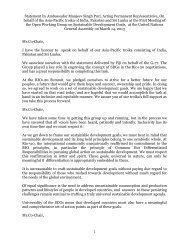STATE OF THE WORLD'S CITIES 2012/2013 Prosperity
STATE OF THE WORLD'S CITIES 2012/2013 Prosperity
STATE OF THE WORLD'S CITIES 2012/2013 Prosperity
You also want an ePaper? Increase the reach of your titles
YUMPU automatically turns print PDFs into web optimized ePapers that Google loves.
<strong>STATE</strong> <strong>OF</strong> <strong>THE</strong><br />
WORLD’S <strong>CITIES</strong><br />
<strong>2012</strong>/<strong>2013</strong><br />
<strong>Prosperity</strong> of Cities<br />
The City is the Home of <strong>Prosperity</strong>. It is the place where human beings find satisfaction of basic needs<br />
and access to essential public goods. The city is also where ambitions, aspirations and other material<br />
and immaterial aspects of life are realized, providing contentment and happiness. It is a locus at<br />
which e prospects of prosperity and individual and collective well-being can be increased.<br />
However, when prosperity is restricted to some groups, when it is used to pursue specific interests, or<br />
when it is a justification for financial gains for the few to the detriment of the majority, the city becomes<br />
the arena where the right to shared prosperity is claimed and fought for. As people in the latter part<br />
of 2011 gathered in Cairo’s Tahrir Square, in Madrid’s Puerta del Sol, in front of London’s St Paul’s<br />
cathedral, or in New York’s Zuccotti Park, they were not only demanding more equality and inclusion;<br />
they were also expressing the need for prosperity to be shared across all segments of society.<br />
What this new edition of State of the World’s Cities shows is that prosperity for all has been<br />
compromised by a narrow focus on economic growth. UN-Habitat suggests a fresh approach to<br />
prosperity beyond the solely economic emphasis, including other vital dimensions such as quality of<br />
life, adequate infrastructures, equity and environmental sustainability. The Report proposes a new<br />
tool – the City <strong>Prosperity</strong> Index – together with a conceptual matrix, the Wheel of <strong>Prosperity</strong>, both of<br />
which are meant to assist decision makers to design clear policy interventions.<br />
The Report advocates for the need of cities to enhance the public realm, expand public goods and<br />
consolidate rights to the ‘commons’ for all as a way to expand prosperity. This comes in response to<br />
the observed trend of enclosing or restricting these goods and commons in enclaves of prosperity, or<br />
depleting them through unsustainable use.<br />
The Report maps out major policy steps to promote a new type of city – the city of the 21st century – that<br />
is a ‘good’, people-centred city. One that is capable of integrating the tangible and more intangible aspects<br />
of prosperity, and in the process shedding off the inefficient, unsustainable forms and functionalities of the<br />
city of the previous century. By doing this, UN-Habitat plays a pivotal role in ensuring that urban planning,<br />
legal, regulatory and institutional frameworks become instruments of prosperity and well-being.<br />
United Nations Human Settlements<br />
Programme (UN-HABITAT)<br />
P.O. Box 30030, Nairobi, Kenya<br />
Tel: +254 20 7621 234<br />
Fax: +254 20 7624 266/7



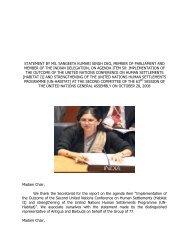
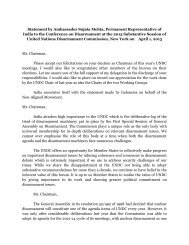
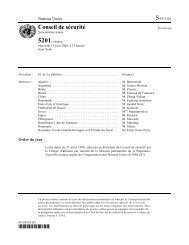
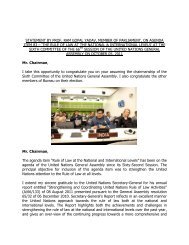
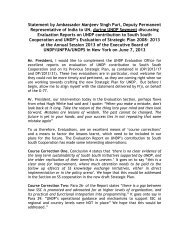
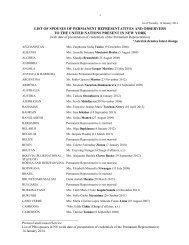
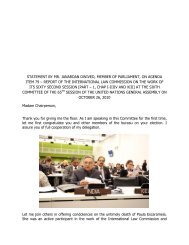
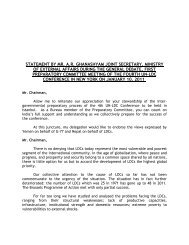
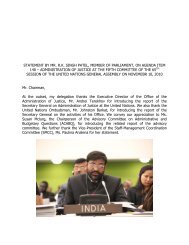
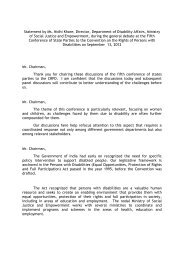
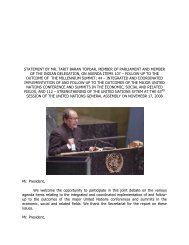
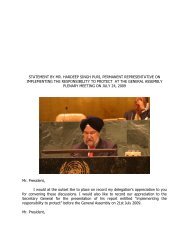
![1 statement by dr.[mrs] kakoli ghosh dastidar - Member States Portal](https://img.yumpu.com/27526598/1/190x245/1-statement-by-drmrs-kakoli-ghosh-dastidar-member-states-portal.jpg?quality=85)
